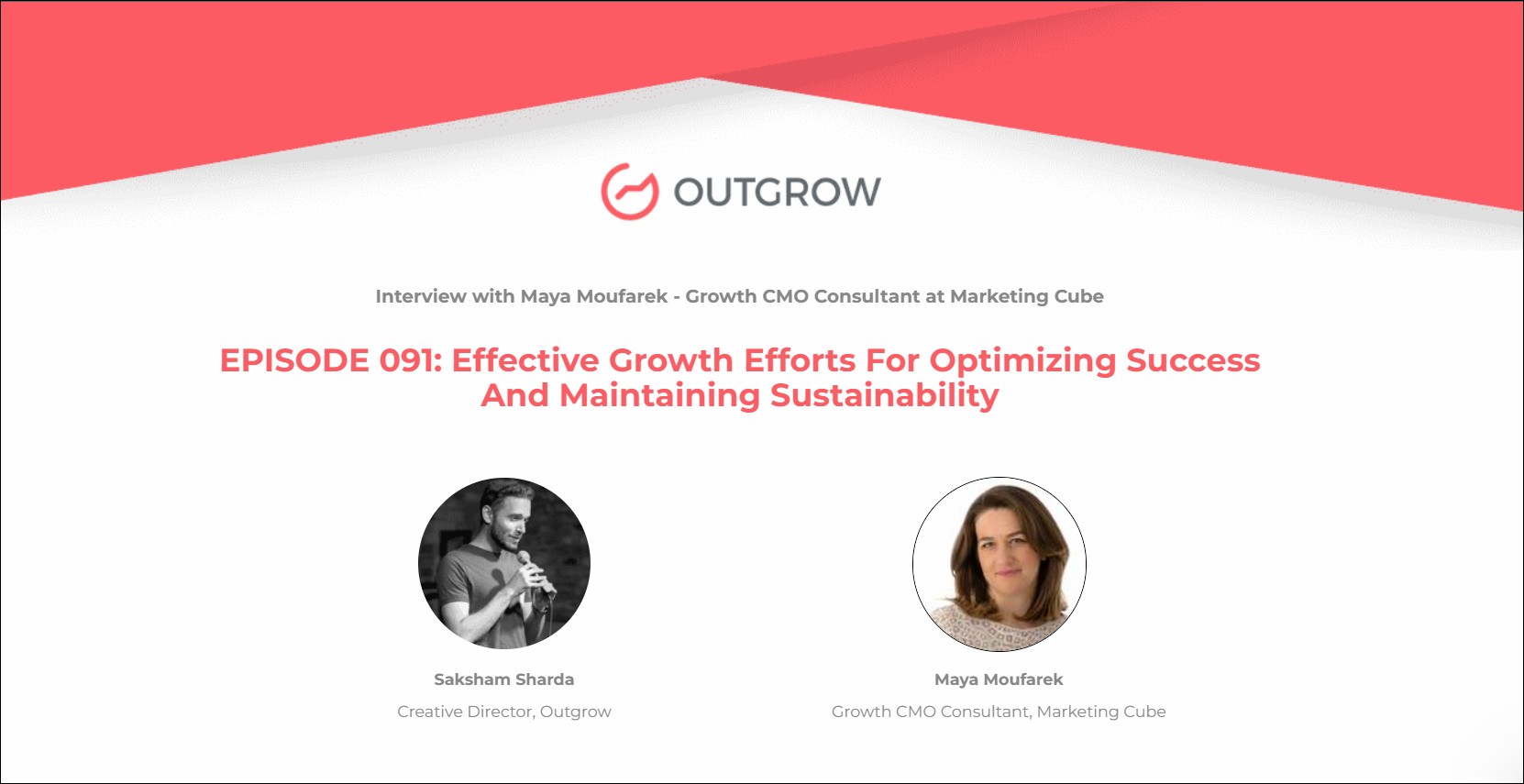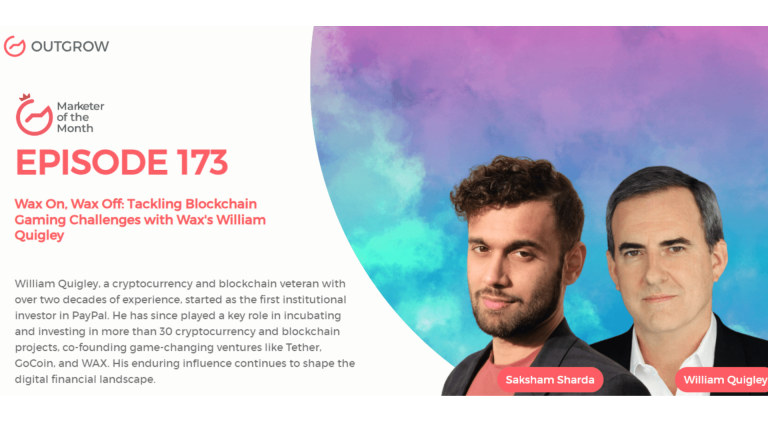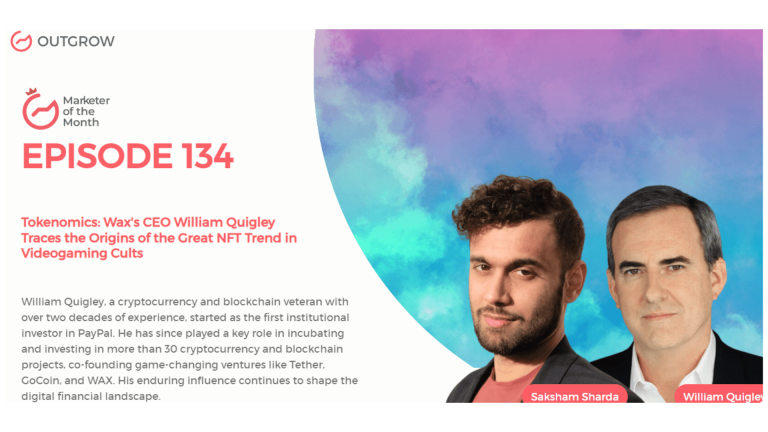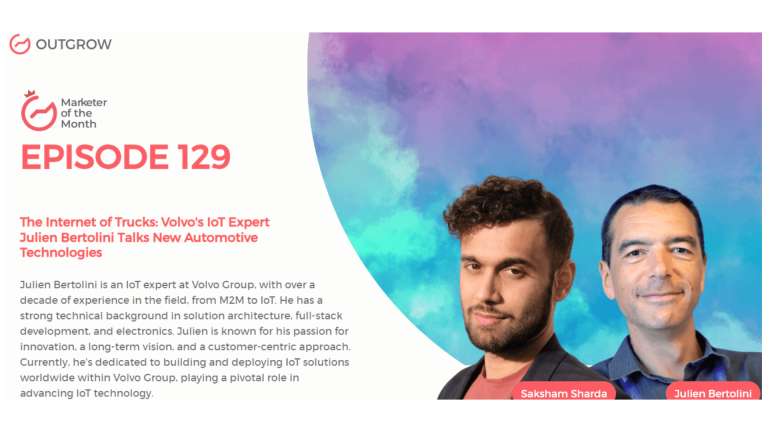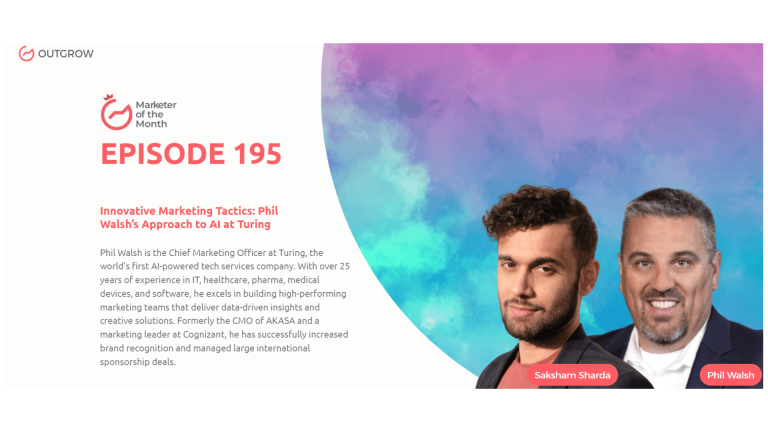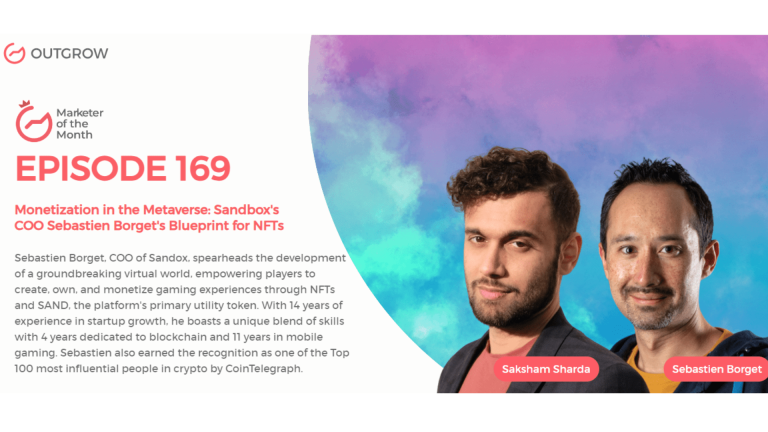Summarize with :
EPISODE 091: Marketer of the Month Podcast with Maya Moufarek
Table of Contents
Hey there! Welcome to the Marketer Of The Month blog!
We recently interviewed Maya Moufarek for our monthly podcast – ‘Marketer of the Month’! We had some amazing insightful conversations with Maya and here’s what we discussed about –
1. What it means to be a ‘full stack’ CMO
2. How the CMO job relates activities to revenue effect and is revenue accountable
3. Why innovation should be in the DNA of an organization as a whole
4. Origin of the growth model
5. How growth includes marketing but is not limited to it
6. What most startups get wrong and right as they scale their businesses
About our host:
Dr. Saksham Sharda is the Chief Information Officer at Outgrow.co. He specializes in data collection, analysis, filtering, and transfer by the means of widgets and applets. Interactive, cultural, and trending widgets designed by him have been featured on TrendHunter, Alibaba, ProductHunt, New York Marketing Association, FactoryBerlin, Digimarcon Silicon Valley, and at The European Affiliate Summit.
About our guest:
Maya Moufarek is a Growth CMO Consultant at Marketing Cube. Spending over 15 years in tech and marketing, she has built countless business growth plans. Maya is passionate about working with ambitious entrepreneurs and purpose-driven CEOs to deliver truly sustainable growth. Tune in to the latest episode of Marketer of the Month to know more about the lessons she’s learned from working with startups and developing strategies, laying solid foundations, and delivering on huge growth ambitions.
Effective Growth Efforts for Optimizing Success and Maintaining Sustainability
The Intro!
Saksham Sharda: Hi, everyone, welcome to another episode of Outgrow’s Marketer of the Month. I’m your host, Dr. Saksham Sharda. I’m the creative director at Outgrow.co. And for this month, we’re going to be interviewing Maya Moufarek, who is the growth CMO consultant at Marketing Cube. Thanks for joining us, Maya.
Maya Moufarek: Thank you for inviting me.
Don’t have time to read? No problem, just watch the Podcast!
Or you can just listen to it on Spotify!
The Rapid Fire Round!
Saksham Sharda: So Maya, we’re going to start with a rapid-fire round just to break the ice. You get three passes. In case you don’t want to answer the question, you can just say pass, but try to keep your answers to one word or one sentence only. Okay?
Maya Moufarek: All right.
Saksham Sharda: So the first one is at what age do you want to retire?
Maya Moufarek: As soon as possible
Saksham Sharda: How long does it take you to get ready in the mornings?
Maya Moufarek: 45 minutes
Saksham Sharda: The most embarrassing moment of your life?
Maya Moufarek: Shaking hands with a celebrity I didn’t know their name.
Saksham Sharda: Favorite color?
Maya Moufarek: Purple.
Saksham Sharda: What time of day are you most inspired?
Maya Moufarek: In the morning
Saksham Sharda: How many hours of sleep can you survive on?
Maya Moufarek: Seven
Saksham Sharda: Fill in the blank: An upcoming marketing trend is ________.
Maya Moufarek: *Guessing*
Saksham Sharda: Okay, that’ll be a pass.
Maya Moufarek: Meaningful marketing.
Saksham Sharda: Okay, the city in which the best kiss of your life happened?
Maya Moufarek: That’s very personal.
Saksham Sharda: You can pass. Okay, pick one Mark Zuckerberg or Jack Dorsey?
Maya Moufarek: Neither
Saksham Sharda: That’s the third pass?
Maya Moufarek: Brian Chesky
Saksham Sharda: The biggest mistake of your career?
Maya Moufarek: Being very impatient.
Saksham Sharda: How do you relax?
Maya Moufarek: Cooking
Saksham Sharda: How many cups of coffee do you drink per day?
Maya Moufarek: For the last three weeks, none.
Saksham Sharda: A habit of yours that you hate?
Maya Moufarek: My need for speed, not in the car.
Saksham Sharda: The most valuable skill you have learned in life?
Maya Moufarek: Thank you and please are very underrated words.
Saksham Sharda: And the last question is your favorite Netflix show?
Maya Moufarek: I don’t know if it was on Netflix. But any kind of tech documentary. I don’t think it was on Netflix. But you know things like that.
Saksham Sharda: All right. Well, that’s the end of the rapid-fire round. There were a couple of passes. But that’s okay.
The Big Questions!
Saksham Sharda: Let’s move on to the long-form questions. The first one is so you can start by telling us a bit about yourself and your current portfolio in your career?
Maya Moufarek: Sure, so I’m a Marketing operator. I partner with tech founders and their executive teams to define and implement their business growth path as what I call full-stack CMOs, really anything from, awareness to retention. My work is anchored in customer insights, data brand, and marketing. And so I founded a growth consultancy, Marketing Cube that you mentioned earlier. Before that, I worked at Google, American Express, and notonthehighstreet. And in my last in-house role, I was digitizing the UK healthcare industry at Pharmacy2U by bringing repeat prescriptions management online, it’s very much a mission-driven business, it was saving the NHS, the UK health service, about 15% in medication costs, and it’s an 8 billion pound cost line. And in my tenure, we started delivering growth rates equivalent to opening an offline pharmacy every two and a half days. There was really strong adoption. Today around the portfolio career that includes angel investing and Board Advisory on top of the growth consulting work that we talked about.
Saksham Sharda: So what would be the main connecting thread according to you in this diverse range of things that you’ve done?
Maya Moufarek: Working with startups working with fast growth businesses, tech lead businesses, kind of using technology for the good, I guess.
Saksham Sharda: So then what do you think that the CMO role should be limited to leading marketing strategy or should they also oversee sales and product, enterprise-wide innovation, distribution channel management, and mission-critical partnerships as per the organization’s needs?
Maya Moufarek: Yeah, I mean, it’s a very wide element, that would be a very big job, someone who had to do all of that. I mean, in organizations with no direct sales team, for example, DTC business, the CMO is by default, the chief revenue officer, right? And so in an organization with a direct sales team, like B2B or something like that, CMOs are core partners to the CRO, so they are revenue accountable and tie in their activity to revenue impact will be short term or long term. So without marketing is a contributing commercial department in my mind, especially if they set up growth engines, as opposed to you how we can be perceived in places as a cost center. So when it comes to product, I do believe it’s a separate kind of partner in the organization to marketing. But there are super close partnership opportunities, especially when it comes to product lead growth, activation, and retention. And then finally, maybe to pick up on one more on your list, innovation in my mind comes from anywhere, and it’s not limited to any specific department in the organization. And so, kind of innovation becomes almost a DNA of an organization as a whole, and everyone contributes in that direction.
Saksham Sharda: So growth has been the core of your work for a long time now. Can you define what the growth focus teams mean? Can you define that for our audience?
Maya Moufarek: Of course, firstly, it’s important to call out that growth is a company focused on strategy beyond having a great team focused on it, and it doesn’t exclusively sit with marketing products or sales for this matter. It requires cross-functional alignment and focus, and a clear set of must-win battles and metrics at the company level for all departments to align with. We know how core growth is to startups. But hopefully, it starts painting this kind of picture, how it’s a corporate-level thing. Growth teams, right, and maybe a little history about growth teams is that in recent years, the idea of hiring a growth marketer within a startup has become increasingly popular. But the growth model was born at Facebook, where they created a growing team of engineers, product managers, designers, data scientists, and marketers, who all participated in the decisions around strategy tactics, experimentation, and priorities, to grow, engage and retain a user base. So it covers this cross-section of a company, connecting engineers, business operators, and user experience teams. And really, that independence will play a key role in this growth entity. Because they were empowered and trusted to follow their hypotheses, they were given space to test different solutions or experiments. And this led to this increase in innovation agility, giving the team more opportunity to take risks, analyze results, and optimize effectively. So that’s the foundation of what a growth team is. And it’s kind of what it was, how it was born out of Facebook, but too often, unfortunately, people now think, a higher growth marketer, and that will sort it, it’s a good step, but it’s a cross-functional piece of work.
Saksham Sharda: So where do you think the entire trend of hiring growth marketers is headed? Are we going to see more of this? Or is it on a decline? How’s the recession going to impact this? What do you think the future hold?
Maya Moufarek: I mean a high-quality growth marketer who retains a base rate and can deliver to those commercial obligations that will always be in demand. Then I think, you know, it’s a mix of the business opportunity at hand and they will be naturally without any recession, all of the more frivolous places, where we spend our money that will be hedged just by the natural behavior of a customer. And then another side will be just, is that growth marketer able to stay on top of doing those experiments, right? And is that an industry in which there is an opportunity to grow further given point? So, I don’t think that growth marketers are going anywhere, but I’m hoping that startups are starting to properly understand that it’s just one piece of the puzzle and really to make it work it needs to be organized at the corporate level, right? Growth is a corporate strategy, not the role of a growth marketer.
Saksham Sharda: So speaking of your own corporate experience, do you recall your first experiences managing and leading teams, what were some of your key learnings from that time?
Maya Moufarek: My first experience leading a team was cross-functional, so not direct line management, I needed to influence regionally or cross-functionally to deliver my project at Google, and worked at American Express, for that matter. This was a wonderful opportunity to build my leadership skill and Flensing skills, stakeholder management skills, and overall coaching skills, because you don’t, you know, nor should we ever have any kind of direct control over people, but it’s not a direct reporting line. So you need to be leading from influencing and coaching and collaborating. All of those skills I think, really helped within direct people management because they’re the skills that are important to be a good direct line manager. I’m also lucky, I guess, to have had a lot of great line managers myself and learn a lot from their styles from their way of operating how they used to be here with me. And then maybe the main learning has been that despite the adage rate, treat others how you’d like to be treated, that does not apply to line management, in my mind. It is, the way you do direct line manager, it’s closer to the way you engage with your customers in my mind, you need to understand their mindset, you know, what matters to them, their ambitions, and how they would like to be supported and how they would like to receive that support. So that I think was my biggest learning through my people management experiences.
Saksham Sharda: And so it’s been almost 15 years of experience working for companies such as Google and American Express. So in what ways did all these experiences that you’ve talked about help you launch your growth consultancy?
Maya Moufarek: I mean, at the end of the day they were my playground, right? They were my learning playground, all of those different places that were growing fast for many of them, like Cisco and Google, are not on the high street. And so my time spent in the tech industry, right? As well as working with startups or scale-ups, exposed me to many founders, product teams, and different business challenges. It also allowed me to polish my product marketing skills, and my understanding of what it takes to find product market fit acquire your first 100 customers, or scale your customer base in operations. Also, it allowed me to witness wonderful brands being more and shaped mature. So really, it’s armed with all the experiences that I now support. The kind of pact, that supports new ventures, and founders on their journeys are solving important problems and, you know, solving meaningful problems in the world. So there was my training ground to package all of that from, you know, early-stage businesses to later-stage businesses and bring it now to new founders.
Saksham Sharda: So to what extent do you think having a playing field like that is important for any founder or growth marketer, or someone who wants to lead their own business, like having an experience in the industry? Is that important and to what extent? Because a lot of people nowadays just believe they should just start their own thing, but they have no idea about the industry. So what would you say about that?
Maya Moufarek: I think there are two angles to it, right? I mean, startups are their little machines, right? And if you had an opportunity to work at a pretty well-run one, you will learn a lot of things about how to handle certain situations, and some best practices, and that’s invaluable. And anyone who usually, you know, any kind of side hustle people who go like, “Oh, I’m going to start my own business.” I’m like, Yeah, I mean, there’s no reason why you want to see them a lot. Well, if you have an opportunity to work within the startup, I think it’s invaluable. To your industry question, arguably the reason pharmacy to you is an online business that two of my colleagues and I were working on. Arguably, it was a success, because we were non-pharmacists, we were consumer people, and we were technology people that applied those best practices to an industry that hadn’t been disrupted in a long time. And, there are not that many, maybe pharmacists who look at it from this technology consumer angle to it. In other cases, right, someone might be coming, I don’t know from the construction industry or you know, some kind of real estate or something like that. And in they have seen the inefficiencies, opportunities that tech could provide those industries and anchored with this very heavy experience in those industries. They can bring technology and others to the table. So I think you kind of need to have both, but it just depends on how complex the industrial challenge is and understanding, you need to have the industry to be able to disrupt it, right? I mean, a pharmacy, yes has a lot of very important medical and clinical compliance element that needs to be put in place. But beyond that, you’re still talking to consumers about the delivery of physical goods that lands on their doorstep. And as much as it’s a life-enhancing, life-saving kind of product that you’re delivering, you have to consider that. You know, we felt that actually, the consumer experience and the Tech experience is what was going to help us succeed. And we’ve been proven right, in that sense.
Saksham Sharda: So having had the successful growth, and marketing consultancy story, what are some of the things, you see startups getting wrong and right, as they scale their businesses?
Maya Moufarek: Yeah. I mean it’s a wide topic, but some core elements come often and when people get those rights, that’s where the magic happens as the industry tends to call it. Not truly knowing their target audience. And what I mean by that is, often there’s a product, there’s founder product fit, if you like, in the center solving a problem they’ve experienced, but they’re still, you know, focus group of one, right, it’s their personal experience. And so sometimes they become, they think they know their audience more than they do. And so really understanding the audience, their context, where truly are they trying to accomplish, what anxieties you might have about trying a new solution. And that can make it hard to engage with your audience if you’re not going to leverage that and deliver a message that truly resonates with them, and also focus your product development in that direction. Another one is trying to be clever with that messaging, and like, maximizing comprehension in the copy. And often, they’re building something new, that needs to be clearly explained. And not some, like the fun play of on words or other things like that. Also being clear about their positioning, right positioning is a strategic exercise that defines where your product and service fits in the marketplace as well as the customer’s lives in mind. Right? So, and also, how is it distinguished from the other solutions, and being able to articulate that very clearly, and making sure that it resonates with what you know about your audience now becomes important. Some people, unfortunately, confuse it with brand purpose sometimes, and brand purpose is really about you know, it’s a sentence that goes, “we exist because” right, we exist because of the statement, and that’s a statement of your venture positive impact on the ecosystem, but it doesn’t specifically positions you in the marketplace, in the customer, mind, etc, just says the good you want to do in the world, right. And positioning is different, it’s all about how you can do X and like y right statement, that’s very much at the core of expressing a position. And it’s much more programmatic and anchored in the benefit statement to your audience. The very final one, I guess, coming back to this growing team and cross-functional work is getting a strong alignment on the venture level, right corporate level objectives, and how the cross-functional teams contribute towards those and how they operate as a growth team and not separate departments to be able to deliver to those ambitions. So kind of spanning a wide both organizational aspect of those teams, but also a lot of it at the end starts with your customer, and anchors in the difference you’re gonna make for them.
Saksham Sharda: Alright, so the last question is speaking of personal questions or personal kind, which is what would you be doing, if not all this in your life right now?
Maya Moufarek: Traveling.
Saksham Sharda: Okay. So that’s what a growth CMO consultant secretly wants to do, travel. Okay. All right.
Let’s Conclude!
Saksham Sharda: Okay, well, that was the last question. So thanks, everyone for joining us for this month’s episode of Outgrow’s Marketer of the Month. That was Maya Moufarek, who is a growth CMO consultant at Marketing Cube. Check out the website for more details and we’ll see you once again next month with another episode.


